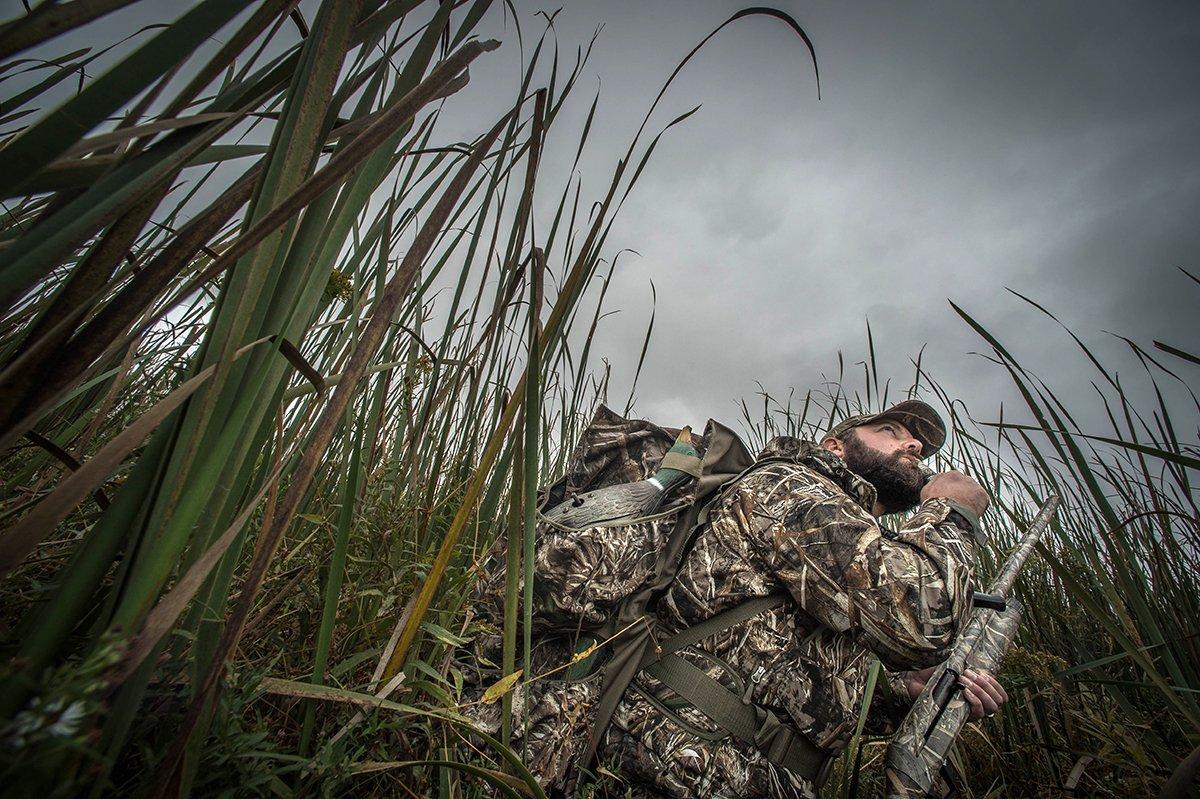From early season wood duck squeals to goldeneye whistles on the final day, this is the music of waterfowl hunting
Waterfowlers probably depend more on their eyes than their ears when trying to fill limits. But relying only on your vision is a sure way to screw up a hunt. And I'm not talking about calling in birds. I'm talking about noticing nearby birds that you haven't seen yet. Or hearing the approach of distant ducks or geese. Whatever the case, waterfowlers should always listen for clues. Here a few less obvious sounds that you might hear from the blind, so listen up this fall. It might even help you bag a few more birds.
Clucks, Honks, Buzzing
Canada geese are often vocal, and their cries carry long distances. During ideal conditions, you can hear honkers waking up on distant roosts or approaching long before they're visible above the horizon. Sometimes, though, quiet geese might only reveal themselves with a soft moan as they're almost in range.
The big birds also have noisy wings that make a distinct buzzing flap when close overhead. This can let you know if geese are circling behind or perhaps making a final pass. Sometimes, that's a pretty strong indication that you should call the shot.
Vapor Trails
Every diver hunter has marveled at the jet-like sound of ringnecks or redheads power-diving into a spread from high altitude. Any duck can make similar sounds as it locks its wings and tears through the air, but blackjacks and redheads do it most often and most spectacularly. Their power and agility is remarkable.
Usually, a volley of gunshots follows the long, loud hiss of a power-dive. Results vary. Either way, after the birds depart, you'll likely look wide-eyed at your blindmates and exclaim, Wow.
Primaries Clawing Air
You've probably experienced this during almost every morning duck hunt. After setting decoys before dawn, you lean back in the blind. Then, your dog snaps its head up as whistling wings from invisible birds flutter overhead. Nothing builds more anticipation. Duck hunters live for that sound, and even if we knew we'd never shoot another bird, we'd probably go afield just to hear that again.
Of course, whistling wings in the dark don't always guarantee success. If nothing else, they remind us why we're out there.
Splashes
Our eyes burn holes in the sky searching for birds, but some tricky devils surprise us by slipping in undetected and landing in the decoys. Often, the culprit is an early season teal or wood duck. Later in fall, it might be a bufflehead or bluebill.
An awkward pause usually follows a splash. Usually, the bird will poke its head up, aware that something isn't quite right. Stand up and take the duck as it departs. Such gifts don't happen every day.
"Hoo-eek"
Any outdoorsman east of the Mississippi River knows well the distinct hoo-eek call of a flying hen wood duck. Sometimes, that alerts you to a streaking incomer. Other days, the sound merely indicates you're in the right neighborhood.
Interestingly, wood ducks have a complex vocabulary that extends far beyond the hoo-eek. Have you listened to woodies on the water before dawn? They make some of the oddest, most haunting vocalizations of any duck. Try to imitate them if you like. I'd rather enjoy the serenade and get ready for streaking rockets at first light.
The Goldeneye Whistle
For big-water guys, this trilling sound signifies two things: The goldeneyes are in, and the last days or weeks of duck season are upon you. These hardy birds cling tight to any open water, no matter the air temperature, often migrating only when forced by Mother Nature.
But back to those wings. It's no wonder folks nicknamed these birds whistlers. You can hear the eerie, piercing whistle of goldeneye primaries hundreds of yards away, even when the birds are specks in the stratosphere. Duck season wouldn't be complete without that symphony, even if it usually marks the coda of the campaign.
Click here for more Realtree waterfowl hunting content. And check us out on Facebook.








